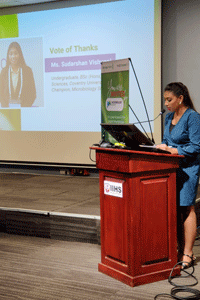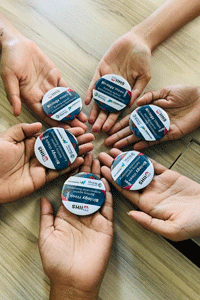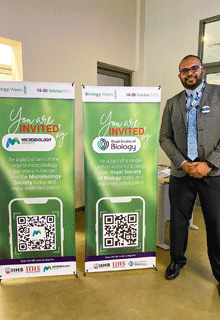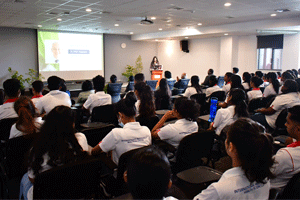‘BioResist: Battling AMR in challenging times’ – changing Sri Lanka’s AMR landscape one student at a time
Posted on November 22, 2023 by Microbiology Society
Society Champion, Sudarshan Vishwani (International Institute of Health Sciences, Sri Lanka) and her lecturer, Society member, Gayan Gunatilake MRSB (International Institute of Health Sciences, Sri Lanka), have recently organised an event focusing on antimicrobial resistance (AMR). The event was titled ‘BioResist: Battling AMR in challenging times’ and was organised to coincide with the UK’s Biology Week. Gayan reflects on the importance of organising this event whilst also highlighting AMR in Sri Lanka.
The start

It was a quiet afternoon when Vishvani spoke to me after a lecture regarding one of her research projects on which she needed advice. She started this project during the first year of her BSc (Hons) Biomedical Science degree, where she developed extractions from the Nuga tree (Ficus benghalensis). The tree is quite popular in South Asia as an Ayurvedic medicine and Vishvani was planning to evaluate its antimicrobial properties. She always possessed enormous optimism, which was refreshing to see from day one. This led me to believe that exciting times were ahead and after the Microbiology Society Annual Conference 2023 in Birmingham, UK, Microbiology Society Champions funding and a hugely successful Biology Week event later, this relationship has grown fruitfully with more ambitious goals in sight.
The challenge
AMR, not a widely discussed topic in Sri Lanka, is also known as ‘the silent pandemic’ due to its status in many other countries. The recent financial crisis in the country diverted attention from pressing issues like AMR, leaving millions of Sri Lankans waiting for basic necessities, such as food and fuel. However, a determined set of professionals and enthusiasts persevered to address the looming threat of AMR.
In the Sri Lankan context, AMR presents heavy challenges due to limited access to quality healthcare, inadequate surveillance and the indiscriminate use of antibiotics. Even now, you can just walk into a pharmacy and request antibiotics over the counter. Most pharmacies do not regulate dispatch where some of our friends (who we have aptly educated on the correct use of it now) would be inclined to go for a self-prescribed dose of antibiotics in the case of a flu or cold. Despite these challenges, there is an increasing need to tackle AMR. Efforts are underway to integrate strategies within the national health policy to combat the spread of AMR, involving key stakeholders from healthcare, agriculture and regulatory bodies. In particular, the National Strategic Plan for Combating AMR was conducted in collaboration with the World Health Organisation in 2015.

The outcomes

Being members of the Microbiology Society and conducting a collaborative event through the Society has been a long-term goal for us both. Learning about the Society’s Knocking out AMR project – and then the Royal Society of Biology’s Biology Week – steered us to combine these two factors, initiating the BioResist event. The event was held in accordance with Biology Week (16–20 October 2023) and consisted of several programmes: an abstract arts competition (open for all); educational AMR presentation sessions; a movie night showcasing the film ‘World War Z’ and a panel discussion with two powerhouses of Sri Lankan microbiology, Dr Vindya Perera and Dr Kushlani Jayatilleke. The event was graced by students from both the International Institute of Health Sciences (IIHS) and regional schools.
One of the key takeaways from the event was the awareness it brought about within school children. The abstract art competition was attended by four local schools and a general theme of the feedback was that the event was a great opportunity for them to learn about pressing issues like AMR in creative ways.
The location of IIHS also plays a major role in the awareness campaign, as it is somewhat far away from the bustling capital city of Colombo. Therefore, it reached neglected local areas where these educational programmes are not usually available. Funding from the Microbiology Society was highly valuable, enabling us and the scientific committee of IIHS to attract students not only internally but externally from the neighbouring communities.
The new beginning
I extend my gratitude to the Microbiology Society for their unwavering support and encouragement from budding student researchers. Their efforts to take microbiology out of academic circles and into the realm of the public are invaluable. Together, we are paving the way for a brighter, more informed approach to combating the threat of AMR and changing Sri Lanka’s AMR landscape, even if it is one student at a time.

Find out more about the Society’s Knocking Out AMR project, where you can register your interest to get involved.
